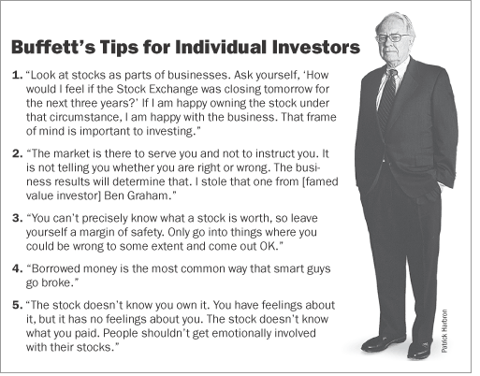Warren Buffet’s Annual Letter to Shareholders Highlights Value Oriented Approach
Post on: 22 Июнь, 2015 No Comment

Berkshire Hathaway (NYSE: BRK.A, BRK.B) issued its annual letter to shareholders on Friday, February 28, 2014. Investors frequently look towards it for ideas, trends, and thoughts from one of the most successful investors in history. Warren Buffet. This year is no different and we highlight some of the key points.
Berkshire may continue to make large purchases and is not ready to sit on the sidelines. Mr. Buffet wants to continue to grow. Indication in the letter are that it will focus on energy as he stated, “NV Energy will not be MidAmerican’s last major acquisition.” Berkshire is know for buying based on cash flows and long-term value. This indicates that it still believes there is value in certain energy stocks and plays. NV Energy supplies energy to about 88% of Nevada’s population and is an electric-utility suppliers.
Energy is a Focus for Buffett
Energy, even outside utilities, remains an interesting area. While commodity prices have pulled back from their highs, stable long-term demand trends remain in place. With the economy strengthening, prices should at least remain stable over the long-term and potentially rise dependent on the strength of the global economy. In addition, there are derivative plays within energy that investors can look towards as the US exports more O&G. The petrochemical industry is benefitting form increased supply of oil and gas. Lower cost and higher feedstock availability will drive revenue and earnings growth for these firms along with energy suppliers.
Last year, Berkshire also participated in the takeover of Heinz for $28 billion. According to Mr. Buffet, the template of the deal used to purchase Heinz could be used in future takeovers. A deal structure with other partners allows Berkshire to more easily make large purchases and resembles a private equity structure. In that deal, Berkshire partnered with 3G. Berkshire purchased $8 billion in preferred stock with a 9% coupon that has upside potential to 12%. Berkshire and 3G each purchased half of the $4.25 billion in common stock. As opposed to a private equity deal with a planned exit, Mr. Buffet stated it could increase its share from other participants looking to sell theirs in the future.
In its other equity holdings, it bought additional shares of IBM and Wells Fargo with each going to 6.3% and 9.2% ownership from 6% and 8.7% respectively. The top five equity holdings by market value are American Express, Coca-Cola, DirecTV, Exxon Mobil and Goldman Sachs.
Invest Based on Normalized Earnings and Outlooks
After describing trends in Berkshire’s various business, Mr. Buffet discusses two investments he personally made a farm and a commercial building in New York. He noted he knew little to nothing of the business but used simple calculations to figure out that the annual return on average was around 10% for the farm and building. He also stated that it appeared there were other factors that provided upside to those investments but that he would have been fine with 10% and bought them. Both did outperform that number in the end.
The moral of the story and of value investing is too have an idea what a stock or business is worth. If the day-to-day fluctuations or shares prices fall below what the company can earn on an average normalized basis, buy more of it. It’s a simple idea, but all too often investors look to what a company will earnings this year or this quarter and forget that it’s a cycle, know what it will earn over that cycle.
In his style, Mr. Buffet continues to say unless you take the time to forecast the bottom end of earnings ranges and value, then non-professional should stick with index funds and buy consistently over time. That will eliminate the volatility from the macro cycle and is a long-term bet on American businesses.
The key takeaways was that Berkshire will keep on making acquisitions and investing. This does demonstrate that Mr. Buffet believes there are still good values available despite the recent bull market . In addition, he may engage in more large deals but utilize transactions that look like Heinz versus going it alone as Berkshire has done in the past. The size of future deals may be large because the size of Berkshire requires it to make an impact on earnings. Electric utilities and other energy companies could become targets based on his comments.














